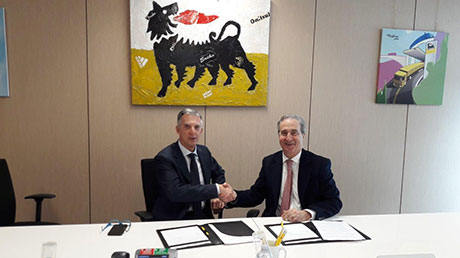Italy-based oil and gas company Eni has signed agreement with Corepla, the Italian national consortium for the collection and recycling of plastic packages, to launch research projects for producing hydrogen from non-recyclable plastic packaging waste.

Image: Eni chief refining & marketing officer Giuseppe Ricci and Corepla president Antonello Ciotti have signed the agreement. Photo: Courtesy of Eni.
Eni chief refining & marketing officer Giuseppe Ricci and Corepla president Antonello Ciotti have signed the agreement.
Under the agreement, a joint working group will work over the next six months to assess the initiation of research projects to produce hydrogen and high-quality biofuels from plastic waste.
In addition, the working group will study the types of waste with potential to develop a positive, innovative circular economy process and maximize recovery, within the scope of new EU directives. The working group also analyzes how the market of non-mechanically recyclable packaging will evolve in the next few years.
During recycling process, plastic packaging waste is sorted and separated before being sent for transformation into chips or grains in order to be reused. Recycled plastic then becomes raw material for creating new products.
Plasmix is a collection of different plastics in used packaging that cannot be sorted or separated and have no use in the market of recycling. It is either sent to energy recovery or end up in landfill.
Eni said that the agreement enables some of plasmix to be recycled and transformed into new raw material and helps strengthening and developing its strategy to apply the principles of the circular economy to its business, based on research and newly developed technologies.
Under the Ecofining patent, Eni has been producing biofuels from used cooking and frying oil, animal fat and other non-edible waste since 2014, in Porto Marghera and also in Gela.
In the process of producing biofuels, hydrogen plays an important role in neutralizing the oxygen in vegetable oil and converting the triglycerides into paraffins and isoparaffins, in order to remove the sulphur, nitrogen and polyaromatic hydrocarbons completely from the biofuel.
Eni said that waste to fuel is it’s another important element of the circular economy, as a pilot plant has been built in Gela to test production of bio-oil and biomethane taken from the organic fraction of municipal solid waste (OFMSW).
